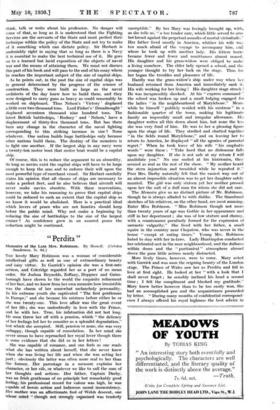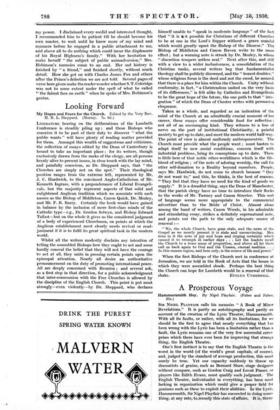" Perdita "
Tok lovely Mary. Robinson was a woman of considerable intellectual gifts as well as one of extraordinary beauty and easy virtue. In Garrick's opinion she was .a first-rate actress, and Coleridge regarded her as a poet of no mean order. Sir Joshua Reynolds, Zoffany, Hoppner and Gains- borough have shown to the world the exquisite refinement of her face; and we know from her own memoirs how irresistible was the charm of her somewhat melancholy- -personality. In his extreme youth she captivated "The first gentleman in Europe," and she became his mistress before either he or she was twenty-one. This love affair was the -great event of her life; she was undoubtedly in love with- the- Prince, and he with her. True, his infatuation did not last long. He soon threw her off with a pension, which "the delicacy of her feelings led her to consider as a splendid degradation," but-which "she accepted. Still, laension-or none, she was very unhappy, though capable of Consolation. In her mind she never seems to haVe reproached her royal lover though there is some evidence that she did so in her letters !
She was capable of romance, and one feels as one reads what she has written about- herself, that she never knew when she was- living her life and when she was acting her part ; obviously the latter was often More real to her than the- • former. Her parentage in a measure explains her character, or her role, or whatever we like to call the sum of her thoughts and actions: Her -father, Captain" Darby, was an Irish gentleman of no principle but remarkably good feeling; his professional record for valour was high, he was capable of heroic action and ludicrous moral inconsistency. Her mother was an affectionate fool of Welsh descent, one whose mind " though not,- strongly organized was 'tenderly
susceptible." By her Mary was lovingly brought up, with, as she tells us, "a too tender care, which little served to arm her breast against the perpetual assaults of mortal vicissitude." Her father lived mostly in America, whither his wife too much afraid of the voyage to accompany him, and where he took up with another lady. His letters home. became fewer and fewer and remittances almost ceased. His daughter and his grass-widow were obliged to make a living somehow. The elder lady opened a school, and the younger thought to try her luck on the stage. Thus for her began the troubles and pleasures of life.
. Hardly was the grass-widow's ship under way when her husband returned from America and immediately sank it. His wife working for her living ! His daughter stage struck ! He was inexpressibly shocked. At his "express command - the school was broken up and a small lodging engaged for the ladies "in the neighbourhood of Marylebone." Mean- while he himself "publicly resided with his mistress" in a fashionable quarter of the town, making his legitimate family an impossibly small and irregular allowance. His daughter writes all this down about him, but none the less she was very fond of him. He was to her a pleasing figure upon the stage of life. They strolled and chatted- together "in the fields round Marylebone," and on leaving her to return to America, he displayed "all the agonies of parental regret." When he took leave of his wife "his emphatic words" were these : "Take heed that no dishonour falls upon my daughter. If she is not safe at my return I will annihilate you." No one smiled at his histrionics, they seemed as real as the rest of the show. "My mother heard the stern injunction. and trembled while he rep-etited it." Poor Mrs. Darby naturally felt that the easiest Way out of an almost impossible situation was to get her daughter safely Married. The girl was only sixteen yet her mother pressed - upon -her the suit of a dull man for whom she did not care. The Memoirs give us no distinct picture of Mr. Robinson, though he is always alluded to with dislike. The thumbnail sketches of his relatives, on the other hand, are most amusing. Enter Miss Robinson. "Miss Robinson though not more than twenty years of age was Gothic in her appearance and stiff in her deportment ; she was of low stature and clumsy, with a countenance peculiarly formed for the expression of sarcastic vulgarity." She lived with her father, a small- squire in the country near Chepstow, who was never in the house "except at eating times." Young Mrs. Robinson hated to stay with her in-laws. Lady Huntingdon conducted her celebrated sect in the near neighbourhood, and the dullness within doors and the " puritanical " atmosphere abroad drove the poor little actress nearly distracted.
More lively times, however, were to come. Mary acted with Garrick and was soon the reigning beauty of the London stage. The Prince of Wales saw her as Perdita and fell in Jove at first sight. He looked at her "with a look that I shall never forget ; he sensibly inclined his head a second time ; I felt the compliment and blushed my gratitude." Mary knew better however than to be too easily won. She had an accomplished pen and the acquaintance proceeded by letter. "During many months of confidential correspond- ence I always offered his royal highness the best advice in
my power. I disclaimed every sordid and interested thought, I recommended him to be patient till he should become his own master, to wait until he knew more of my mind and manners before he engaged in a public attachment to me, and above all to do nothing which could incur the displeasure of his Royal Highness's family." With her hesitation to make herself "the subject of public animadversion," Mrs. Rbbinson's memoirs come to an end. Her sad history: is finished by "a friend," and finished shortly, without much detail. How she got on with Charles James Fox and others after the Prince's defection we are not told. Several pages of- verse here given make the reader wonder whether S. T. Coleridge was not to some extent under the spell of what he called "the fairest face on earth" when he spoke of Mrs. Robinson's genius.







































 Previous page
Previous page